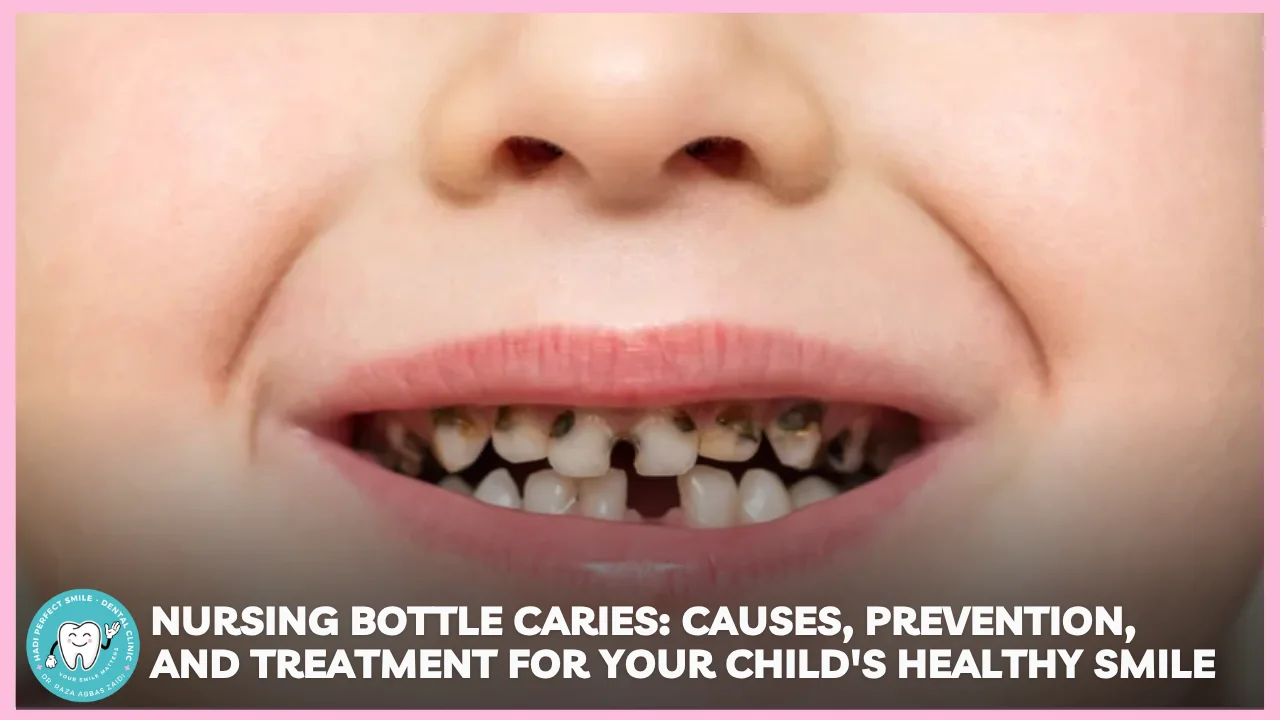What is Nursing Bottle Caries?
Nursing bottle caries, also known as baby bottle tooth decay, is a serious form of tooth decay that affects infants and toddlers. It occurs when a child’s teeth are frequently exposed to sugary liquids such as milk, formula, or fruit juice—especially when consumed from a bottle at bedtime or during naps.
At Hadi Perfect Smile Dental Clinic, we understand how important your child’s oral health is. Our goal is to educate parents on the dangers of nursing bottle caries and how they can protect their child’s precious smile right from the start.
Understanding the Causes of Nursing Bottle Caries
Nursing bottle caries typically develops in the upper front teeth but can affect other teeth as well. Here’s how and why it happens:
1. Frequent Exposure to Sugary Drinks
When babies sleep with bottles containing milk, formula, or sweetened liquids, these sugars pool around their teeth. Bacteria in the mouth feed on the sugar and produce acids that attack the enamel.
2. Poor Oral Hygiene
Inadequate cleaning of the baby’s gums and teeth allows plaque and bacteria to build up.
3. Sleeping with a Bottle
During sleep, less saliva is produced. Saliva helps wash away sugars and acids. With reduced saliva, the mouth becomes more acidic and prone to decay.
4. Lack of Fluoride
Children who do not receive adequate fluoride, either through drinking water or dental products, are at greater risk of tooth decay.
Early Signs and Symptoms
Early detection of nursing bottle caries can help prevent extensive damage. Look out for:
- White spots or lines near the gumline of front teeth (early decay).
- Brown or black spots on teeth.
- Bad breath or swollen gums.
- Discomfort or pain while eating or drinking.
- In severe cases, broken or missing teeth.
If you notice any of these signs, visit Hadi Perfect Smile Dental Clinic for a prompt examination and treatment.
Why Baby Teeth Matter
Many parents believe that because baby teeth fall out, they don’t need as much care. This is a myth. Primary teeth are essential for:
- Proper chewing and nutrition.
- Speech development.
- Holding space for permanent teeth.
- Building confidence and self-esteem through a healthy smile.
How to Prevent Nursing Bottle Caries
1. Clean the Mouth Daily
Before teeth erupt, clean your baby’s gums with a soft, damp cloth. After teeth appear, brush with a small, soft-bristled toothbrush and a smear of fluoride toothpaste.
2. Avoid Bottles at Bedtime
Don’t put your child to bed with a bottle of milk, formula, or juice. If needed, only give water.
3. Wean from the Bottle Early
Encourage drinking from a cup by 12-14 months of age.
4. Use Fluoride Toothpaste
Use an age-appropriate amount of fluoride toothpaste to strengthen enamel and prevent decay.
5. Balanced Diet
Limit sugary snacks and drinks. Offer healthy alternatives like fruits, vegetables, and cheese.
6. Regular Dental Check-Ups
Visit Hadi Perfect Smile Dental Clinic as soon as the first tooth appears or by the child’s first birthday. Early check-ups help in preventing and identifying dental issues early on.
Treatment Options for Nursing Bottle Caries
At Hadi Perfect Smile Dental Clinic, we provide gentle and effective treatment options tailored to your child’s needs.
1. Fluoride Treatments
Early-stage decay may be reversed with professional fluoride varnishes that help remineralize tooth enamel.
2. Dental Fillings
If the decay has progressed, tooth-colored fillings can restore function and appearance.
3. Crowns
For severely decayed teeth, stainless steel crowns may be used to protect the tooth.
4. Extractions
In extreme cases where the tooth cannot be saved, extraction may be necessary. A space maintainer might be needed to keep the space for permanent teeth.
The Role of Parents in Prevention
Parents and caregivers play a crucial role in preventing nursing bottle caries. Here’s how you can help:
- Be a role model: Maintain your own oral health to encourage your child.
- Avoid sharing utensils with your child, which can transfer bacteria.
- Don’t dip pacifiers in sugar or honey.
- Create a dental routine early and stick to it.
Common Myths About Nursing Bottle Caries
Myth 1: Only Juice Causes Cavities
Fact: Any drink containing natural or added sugars, including milk and formula, can contribute to tooth decay.
Myth 2: Cavities in Baby Teeth Don’t Matter
Fact: Cavities can lead to infections, affect permanent teeth, and cause speech or eating difficulties.
Myth 3: Teething Babies Don’t Need Dental Care
Fact: Dental care should begin even before the first tooth erupts.
When to Visit the Dentist
Schedule your child’s first dental visit by their first birthday or within 6 months of the first tooth erupting. Routine check-ups every six months are vital.
At Hadi Perfect Smile Dental Clinic, we make dental visits fun and comfortable for children, helping build lifelong oral care habits.
Conclusion
Nursing bottle caries is a preventable condition that can have serious consequences if left untreated. By understanding its causes, recognizing the symptoms early, and practicing proper dental hygiene, you can safeguard your child’s smile for years to come.
Trust Hadi Perfect Smile Dental Clinic for compassionate pediatric dental care and expert guidance for your child’s oral health journey.
📞 Book your consultation today
📍 Hadi Perfect Smile Dental Clinic – Your Smile Matters
📱 +91-7011690245
🌐 www.hadiperfectsmile.in






